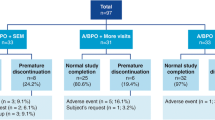Abstract
Background
Evidence regarding what comprises effective education for acne vulgaris patients is lacking. Internet-based education may improve patient knowledge of this condition.
Objectives
Our objective was to compare the effectiveness of standard web-based education and an automated counseling website in improving acne knowledge.
Design
In a randomized trial, participants visited either a standard website or an automated counseling website to learn about acne. Multiple-choice questions were administered at baseline and after 12 weeks to assess change in acne knowledge.
Results
A total of 97 high school students were enrolled, and 95 completed the study. The standard website group had a significant increase in knowledge from baseline (3.61 ± 1.22) to 12-week follow-up (5.46 ± 1.31, p < 0.001). Similarly, the automated counseling website group had a significant increase in knowledge between both time points (3.53 ± 1.50 vs. 6.49 ± 1.06, p < 0.001). After 12 weeks, mean improvement in knowledge was higher in the automated counseling group (2.96 ± 1.85) than in the standard website group (1.85 ± 1.46, d = 0.67, p = 0.002). The number of website visits was positively correlated with improvement in knowledge in both groups. Finally, the automated counseling website group rated their educational material more useful (p = 0.004) and more enjoyable to view (p = 0.003) than did the standard website group.
Limitations
This study is limited to adolescents with mild-to-moderate acne vulgaris.
Conclusion
Internet-based patient education appears to be an effective method of improving acne knowledge among adolescents.



Similar content being viewed by others
References
Bhate K, Williams HC. Epidemiology of acne vulgaris. Br J Dermatol. 2013;168(3):474–85. doi:10.1111/bjd.12149.
Tan JK, Vasey K, Fung KY. Beliefs and perceptions of patients with acne. J Am Acad Dermatol. 2001;44(3):439–45. doi:10.1067/mjd.2001.111340.
Brajac I, Bilic-Zulle L, Tkalcic M, Loncarek K, Gruber F. Acne vulgaris: myths and misconceptions among patients and family physicians. Patient educ Couns. 2004;54(1):21–5. doi:10.1016/S0738-3991(03)00168-X.
Miyachi Y, Hayashi N, Furukawa F, Akamatsu H, Matsunaga K, Watanabe S, et al. Acne management in Japan: study of patient adherence. Dermatology. 2011;223(2):174–81. doi:10.1159/000332847.
Katsambas AD. Why and when the treatment of acne fails. What to do. Dermatology. 1998;196(1):158–61.
Tuong W, Larsen ER, Armstrong AW. Videos to influence: a systematic review of effectiveness of video-based education in modifying health behaviors. J Behav Med. 2014;37(2):218–33. doi:10.1007/s10865-012-9480-7.
Krishna S, Francisco BD, Balas EA, Konig P, Graff GR, Madsen RW, et al. Internet-enabled interactive multimedia asthma education program: a randomized trial. Pediatrics. 2003;111(3):503–10.
Armstrong AW, Idriss NZ, Kim RH. Effects of video-based, online education on behavioral and knowledge outcomes in sunscreen use: a randomized controlled trial. Patient Educ Couns. 2011;83(2):273–7. doi:10.1016/j.pec.2010.04.033.
Armstrong AW, Kim RH, Idriss NZ, Larsen LN, Lio PA. Online video improves clinical outcomes in adults with atopic dermatitis: a randomized controlled trial. J Am Acad Dermatol. 2011;64(3):502–7. doi:10.1016/j.jaad.2010.01.051.
Livingstone S. Children’s use of the internet: reflections on the emerging research agenda. New Media Soc. 2003;5(2):147–66. doi:10.1177/1461444803005002001.
Bickmore TW, Schulman D, Sidner C. Automated interventions for multiple health behaviors using conversational agents. Patient Educ Couns. 2013;92(2):142–8. doi:10.1016/j.pec.2013.05.011.
Bickmore TW, Silliman RA, Nelson K, Cheng DM, Winter M, Henault L, et al. A randomized controlled trial of an automated exercise coach for older adults. J Am Geriatr Soc. 2013;61(10):1676–83. doi:10.1111/jgs.12449.
Wang A, Armstrong A, Schupp C, Wu J. Randomized controlled trial examining effectiveness of a novel personalized interactive health care education tool for acne patients (MyPACE). J Am Acad Dermatol. 2013;68(4 Suppl 1):AB18.
Kerfoot BP, Baker HE, Koch MO, Connelly D, Joseph DB, Ritchey ML. Randomized, controlled trial of spaced education to urology residents in the United States and Canada. J Urol. 2007;177(4):1481–7. doi:10.1016/j.juro.2006.11.074.
Acknowledgments
The project described was supported by the National Center for Advancing Translational Sciences (NCATS), National Institutes of Health (NIH), through grant #UL1 TR000002.
Conflict of interest
Mr. William Tuong has no relevant conflicts of interest to declare. Dr. Audrey S. Wang has no relevant conflicts of interest to declare. Dr. April W. Armstrong has no relevant conflicts of interest to declare.
Author information
Authors and Affiliations
Corresponding author
Electronic supplementary material
Below is the link to the electronic supplementary material.
Rights and permissions
About this article
Cite this article
Tuong, W., Wang, A.S. & Armstrong, A.W. Comparing the Effectiveness of Automated Online Counseling to Standard Web-Based Education on Improving Acne Knowledge: A Randomized Controlled Trial. Am J Clin Dermatol 16, 55–60 (2015). https://doi.org/10.1007/s40257-014-0104-6
Published:
Issue Date:
DOI: https://doi.org/10.1007/s40257-014-0104-6




